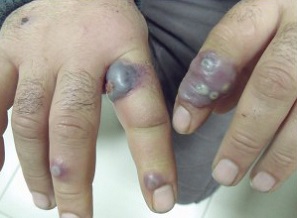BREAKING! 56,000 Sheep Headed To Kuwait And Saudi Arabia From South Africa Infected With Orf Virus Which Is Also A Threat To Humans!
Nikhil Prasad Fact checked by:Thailand Medical News Team Apr 16, 2024 1 year, 9 months, 4 weeks, 1 day, 4 hours, 35 minutes ago
Medical News: The National Council of SPCAs (NSPCA) recently sounded the alarm regarding an infectious disease outbreak at a feedlot in East London (Not UK!) in South Africa, where 56,000 sheep, along with cattle and goats, were being prepared for live export to Kuwait and Saudi Arabia aboard the livestock carrier Al Messilah. This
Medical News report delves into the implications of this outbreak, the risks posed to animal welfare and human health, and the urgent need for stringent measures to address such situations.
 56,000 Sheep Headed To Kuwait And Saudi Arabia From South
56,000 Sheep Headed To Kuwait And Saudi Arabia From South
Africa Infected With Orf Virus Which Is Also A Threat To Humans
NSPCA Raise Concerns Over Disease Outbreak In Sheep And Potential Threat To Humans.
The NSPCA confirmed the presence of Orf virus that causes contagious ecthyma, an infectious dermatitis affecting sheep and goats, also known as "Orf," "Vuilbek," or "Scabby Mouth." The outbreak in the Al Mawashi feedlot, discovered through laboratory testing and visual examination, has raised serious concerns about the welfare of the animals destined for the Al Messilah vessel.
https://nspca.co.za/contagious-ecthyma-diagnosed-in-al-mawashi-feedlot/
But health experts are also worried about the health threat to humans and the possibility of a new strain of Orf virus emerging.
Orf virus is a member of the parapoxvirus genus in the Poxvirus family. This virus primarily causes an infection in sheep and goats, but it can also be transmitted to humans. Individuals that are infected typically develop ulcerative lesions or nodules on their hands and fingers, also on the feet, legs, neck, and face.
https://www.cdc.gov/poxvirus/orf-virus/people.html
Humans that are immunocompromised are typically faced with worse outcomes and with COVID-19 already causing immune dysfunctionality in many, the impact from exposure to Or virus could be disastrous. The disease is highly contagious.
Implications for Animal Welfare
Contagious ecthyma can lead to animals going off feed, losing condition, and developing severe secondary infections, particularly during the three-week journey to the Middle East. The NSPCA's proactive measures in pulling affected animals from the feedlot highlight the urgency of addressing animal welfare concerns in live export scenarios.
Potential Rejections and Stranded Animals
Past rejections of shipments from Australia due to similar disease outbreaks in the Middle East raise concerns about the fate of the current shipment. If Kuwait and Saudi Arabia reject the animals, South Africa has indicated that it may not be able to accept their return, potentially leaving thousands of animals stranded at sea - a dire situation that requires immediate attention and contingency planning.
>
NSPCA's Stance and Actions
The NSPCA's steadfast stance on animal welfare and concerns about human health threat demonstrate the critical role of regulatory bodies and animal welfare organizations in safeguarding the well-being of animals in the livestock industry. Their diligence in screening for diseases like contagious ecthyma is essential in preventing unnecessary suffering and mitigating risks to both animal and human health.
Challenges in Livestock Vessel Welfare
Despite efforts to ensure animal welfare on livestock vessels, challenges persist in guaranteeing optimal conditions throughout the journey. Issues such as space limitations, feed accessibility, and disease management underscore the complexities involved in live animal export and highlight the need for ongoing scrutiny and improvement in industry practices.
Collaborative Efforts for Sustainable Solutions
Addressing infectious disease outbreaks and enhancing animal welfare in live export require collaborative efforts involving government agencies, industry stakeholders, and animal welfare advocates. Implementing robust biosecurity measures, investing in veterinary care during transit, and exploring alternatives to long-haul live shipments are crucial steps toward sustainable and ethical practices in the livestock trade.
Lessons Learned and Future Preparedness
The current outbreak serves as a poignant reminder of the risks inherent in live animal export and the importance of proactive measures in disease prevention and animal welfare. Learning from this experience, stakeholders must prioritize ongoing monitoring, research into disease resilience, and contingency planning to mitigate similar crises in the future.
Conclusion
The infectious disease outbreak in the South Africa’s feedlot highlights the intersecting challenges of animal welfare, human health risks, and logistical complexities in live animal export. Urgent action is needed to address the immediate concerns raised by the NSPCA, while also fostering long-term strategies for sustainable and ethical practices in the livestock industry. Collaboration, innovation, and a steadfast commitment to welfare standards are essential in safeguarding the well-being of animals and promoting responsible trade practices globally.
For the latest about the Orf Virus, keep on logging to Thailand
Medical News.
